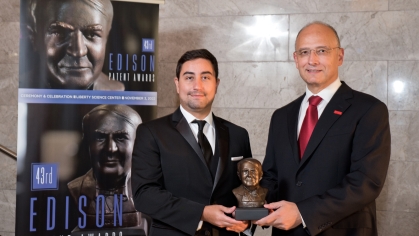New Graduate Certificate in Socially Cognizant Robotics
The new graduate training and research certificate was created with funding from a prestigious, $3 million, five-year National Science Foundation Research Traineeship (NSF NRT) award titled “SOCRATES: Socially Cognizant Robotics for a Technology Enhanced Society.”
According to Kristin Dana, a professor in the Department of Electrical and Computer Engineering, and NSF NRT project PI, the new Certificate in Socially Cognizant Robotics was developed through the SOCRATES team’s unique interdisciplinary collaboration with faculty from the School of Engineering, School of Arts and Science, and Bloustein School of Planning and Public Policy.
The innovative new certificate program, which is open to Rutgers graduate students, integrates technology domains of robotics, machine learning, and computer vision with social and behavioral sciences, including psychology, cognitive science, and urban policy planning.
A Place at the Table for Socially Cognizant Roboticists
“The vision for the program is to educate students interested in exploring robotics from a multi-discipline approach that considers robotics’ impact to individuals and society at the design stage and not as an afterthought,” explains Dana.
Through a set of core interdisciplinary courses and subdisciplines – robot embodiment, control and planning; computer vision; language and dialogue; cognitive science; urban planning and policy development – the new certificate program is training a new generation of socially aware technologists and technology aware social scientists.
Despite the immense potential of robotics and AI to impact societal good, there are potential risks, making the need for socially cognizant roboticists increasingly clear. “We’re seeing how robotics and AI will affect our everyday life with driverless cars, large language models like ChatGPT, and home automation robots,” Dana notes. “At the same time, dangers are emerging, such as driverless car crashes, manipulative conversations in chat-bots, and photos taken by robot vacuums in homes. This is a difficult problem, with many open and unresolved issues.”
Adapting Technology to Humanity
The success of robotics is traditionally measured by speed, accuracy, precision, cost, and efficiency. Yet, according to Dana, including less readily quantifiable human-centered metrics is extremely important.
“When designers and decision-makers consider the bottom line, human-centered metrics must be an important part of this equation,” she insists. “If humans can’t trust robots, they will rightfully reject them, and meeting technical milestones will be a waste of time.”
“Integrating technology with social and behavioral sciences is critical to ensure that technology adapts to rules of humanity, instead of expecting humanity to adapt to technology,” Dana says.


